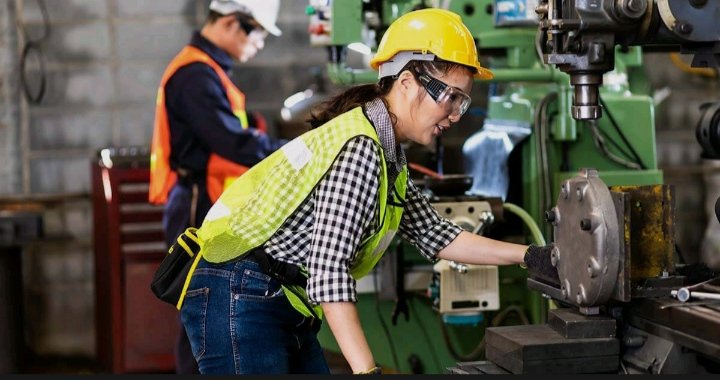How Many Jobs Are Available In Industrial Machinery Components in 2025?

Do you want to know How Many Jobs Are Available In Industrial Machinery Components in 2025?
Then you’re in the right place.
The industrial machinery components industry offers a variety of job opportunities in areas like manufacturing, design, repair, and maintenance.
With the sector growing to meet global demand, there are thousands of positions available for skilled workers, engineers, and technicians.
These roles support industries like automotive, construction, and energy.
As technology advances, the need for specialized expertise in machinery components makes this field a promising choice for long-term career growth.
Grab a chilled glass of water and keep reading….
ALSO READ: How Many Jobs Are Available In Auto Parts OEM 2025?
What Is the Industrial Machinery Components Industry?

The industrial machinery components industry focuses on delivering cost-effective manufacturing solutions, machinery, and tools to other businesses.
Companies in this sector manufacture, maintain, and supply machinery while also developing manufacturing strategies for clients.
Sub-sectors within this industry include:
- Metalworking machinery
- Construction and mining machinery
- Ventilation, heating, and air-conditioning machinery
- Engine and power transmission equipment and machinery
This industry plays a critical role in supporting global production and innovation.
How Many Jobs Are Available in Industrial Machinery Components?
The industrial machinery components industry is constantly evolving due to technological advancements and innovations.
According to the U.S. Bureau of Labor Statistics (BLS), employment in this sector is projected to grow by 14% by 2031, with 53,200 job openings annually.
Many vacancies arise as workers retire or switch careers, creating numerous opportunities.
Top 5 Roles With the Highest Employment Opportunities:
- Team Assemblers: 129,480 roles
- Welders, Brazers, Cutters, and Solderers: 66,370 roles
- Machinists: 65,490 roles
- Mechanical Engineers: 40,830 roles
- Computer-Controlled Machine Tool Operators: 31,950 roles
How Much Do Jobs in Industrial Machinery Components Pay?
Jobs in this sector often offer above-average salaries. According to the BLS, the national average salary in industrial machinery components is $58,380, slightly above the average for all U.S. professions.
Highest-Paying Roles Include:
- Millwrights: $60,330 annually
- Industrial Machinery Mechanics: $59,840 annually
These competitive salaries, combined with career growth opportunities, make this industry a promising career path for skilled professionals.
ALSO READ: How Many Jobs Are Available In EDP Services?
8 Jobs in Industrial Machinery Components
Here is a list of high-paying jobs in the industrial machinery components industry, arranged from the highest salary to the lowest:
1. Technical Sales Manager
- National Average Salary: $83,400 per year
- Primary Duties:
- Develop and implement sales strategies to retain and attract customers.
- Oversee day-to-day operations of the technical sales department.
- Delegate tasks, address customer needs, monitor market trends, and ensure the company meets sales goals.
2. Industrial Engineer
- National Average Salary: $80,816 per year
- Primary Duties:
- Design and create efficient production layouts and processes.
- Optimize productivity and product quality while minimizing waste and costs.
- Tasks include improving manufacturing methods, enforcing quality control, and managing production schedules.
3. Industrial Hygienist
- National Average Salary: $81,340 per year
- Primary Duties:
- Ensure workplace safety by identifying hazards like chemical exposures.
- Plan and implement processes for handling harmful materials.
- Introduce health and safety rules such as training programs and protective equipment requirements.
4. Industrial Designer
- National Average Salary: $69,107 per year
- Primary Duties:
- Combine engineering expertise and artistic creativity to design industrial products like cars or appliances.
- Create sketches, develop prototypes, and research suitable materials.
- Collaborate with clients to deliver attractive and effective solutions.
5. Boilermaker
- National Average Salary: $64,797 per year
- Primary Duties:
- Assemble, install, and maintain boiler systems and other large containers like tanks and heat exchangers.
- Use specialized tools such as turnbuckles and plumb bobs to complete tasks.
6. Machinist
- National Average Salary: $61,741 per year
- Primary Duties:
- Produce and repair precision metal parts using milling machines, grinders, and CNC machinery.
- Operate a combination of automated and manual equipment.
- Advanced computing knowledge is essential for CNC operations.
7. Welder
- National Average Salary: $57,766 per year
- Primary Duties:
- Assemble and repair damaged metal parts for manufacturing tools and machines.
- Use extreme heat to mold metal components into shape.
- Analyze blueprints and ensure smooth finishing of molten metals.
8. Industrial Maintenance Technician
- National Average Salary: $49,794 per year
- Primary Duties:
- Conduct maintenance tasks in industrial settings to ensure machinery is functioning safely.
- Troubleshoot, install, and repair equipment such as presses, boilers, and ovens.
These roles highlight the diverse career opportunities available in the industrial machinery components sector, offering competitive salaries and growth potential.
How Many Jobs Have Machines Taken?
- 1.7 million manufacturing jobs have already been lost to automation.
- By 2030, up to 20 million manufacturing jobs could be replaced by robots.
What Does Industrial Machinery Do?
Industrial machinery is used to enhance efficiency and productivity in manufacturing and production.
It enables the mass production of goods, increasing output while reducing time and labor costs.
Conclusion
The industrial machinery components industry continues to grow, offering thousands of job opportunities due to advancements in technology and automation.
By 2025, the sector is expected to create over 50,000 job openings annually, driven by retirements and career transitions.
Roles such as industrial engineers, machinists, and technicians will remain in high demand, providing competitive salaries and long-term career potential in this evolving field.
ALSO READ: How Many Jobs Are Available in Miscellaneous & Salaries





